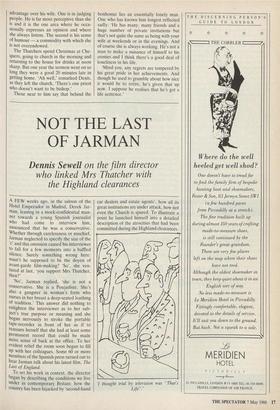NOT THE LAST OF JARMAN
who linked Mrs Thatcher with the Highland clearances
A FEW weeks ago, in the saloon of the Hotel Emperador in Madrid, Derek Jar- man, leaning in a mock-confidential man- ner towards a young Spanish journalist who had come to interview him, announced that he was a conservative. Whether through carelessness or mischief, Jarman neglected to specify the size of the 'c' and this omission caused his interviewer to fall for a few moments into a baffled silence. Surely something wrong here: wasn't he supposed to be the doyen of avant-garde film-making? 'So', she ven- tured at last, 'you support Mrs Thatcher, then?'
'No', Jarman replied, 'she is not a conservative. She is a Poujadiste. She's also a gangster in woman's form who nurses in her breast a deep-seated loathing of tradition.' This answer did nothing to enlighten the interviewer as to her sub- ject's true purpose or meaning and she began nervously to stroke the portable tape-recorder in front of her as if to reassure herself that she had at least some permanent record that could be made more sense of back at the office. To her evident relief the room soon began to fill up with her colleagues. Some 60 or more members of the Spanish press turned out to hear Jarman talk about his latest film, The Last of England.
To set his work in context, the director began by describing the conditions we live under in contemporary Britain: how the country has been hijacked by 'second-hand car dealers and estate agents', how all its great institutions are under attack, how not even the Church is spared. To illustrate a point he launched himself into a detailed description of the atrocities that had been committed during the Highland clearances.
'1 thought trial by television was "That's This part received a mixed reaction from his audience: the young and idealistic were noticeably scandalised; those who had spent the better part of their lives under Franco displayed the equanimity of men who have seen it all before. Both groups, however, were quite clearly under the impression that the events in question had taken place in Scotland since 1979.
'Now she is starting on the inner cities,' Jarman went on, and warming to his theme he evoked the landscape of his film: post-industrial rubble; here a junkie fixing in the ruins; there one man buggering another by a rubbish tip upon which have been abandoned all the great pictures from our galleries, partly ripped from their frames. 'No opposition is tolerated ... dis- sent ruthlessly crushed ... families to be broken up by a tax on just being alive.' All this was furiously scribbled into notebooks along with 'a new law which bans David Hockney's paintings.., will ban my films... may even ban Shakespeare in Britain's schools.' The Spaniards listened politely, asked one or two questions about Aids and went off quietly to file their copy.
Jarman, unlike the figures in the Ford Madox Brown painting from which his film takes its title, had not bid farewell to his native land. Two days later he returned to England, the proud possessor of the Cri- tics' Prize from the Madrid Film Festival. He came back not in peace but as one determined to continue to deliver his col- ourful brand of polemic from whichever platform will accommodate him. He has taken to appearing in theatres and univer- sities up and down the country. In March he spoke in a public debate about Clause 28 with Gerald Howarth MP and came away profoundly shaken by the experi- ence. Howarth had spoken of homosexual- ity in terms of 'chemical imbalance' and of homosexuals as people who did not fit in with 'the Almighty's plan'. Earlier in the year Norman Stone, Professor of Modern History at Oxford, launched an attack on contemporary films and on The Last of England in particular. Among Professor Stone's arguments were that films should have plots with beginnings, middles and ends and should not give a bad impression of Britain to foreigners.
Last week Jarman and Stone were due to debate this issue at the Everyman Cinema in Hampstead. As it turned out, Professor Stone was ill but a paper he had prepared was read to a packed house by a Sunday Times journalist. During the formal pro- ceedings Jarman kept to the subject, using the occasion to develop another of his themes: that market forces are actually malevolent and lead to a rigid cultural uniformity. But afterwards his mood be- came more expansive as he turned once again on Mrs Thatcher and all her doings. What became clear was that, at heart, he really is a conservative and that what (as a Marxist might put it) has `politicised' him has been Clause 28.
Jarman has always had a longing to be accepted by institutions and by the estab- lishment but has been denied this accept- ance because of his homosexuality. In the 1960s he and many others like him felt that they had finally won that acceptance but now sense the stirrings of a new intolerance when politicians say they are not part of 'the Almighty's plan'. 'I've been trying all my life to fit in,' he says, `but now I'm fed up. I'm going on the attack.' Ever the traditionalist he calls to his banner all the notable homosexuals of the past: 'Isaac Newton was one, you know, and Kitchener — that finger was really pointing to all the boys as they went by and saying "I want you...." Richard Coeur de Lion — I bet he looked like Quentin Crisp — if only he'd been there at the head of the march when we campaigned against Clause 28.'
Derek Jarman's own crusade comes, however, too late. Nothing more can be done about Clause 28. But it is not beyond his creative imagination to plot a mis- chievous revenge: perhaps a mass lobby of Parliament on some related issue which sees Gerald Howarth pursued along the corridors of Westminster by homosexuals in period dress. Whether this really takes place or merely finds its way onto celluloid, I doubt if we have heard the last of Jarman.























































 Previous page
Previous page